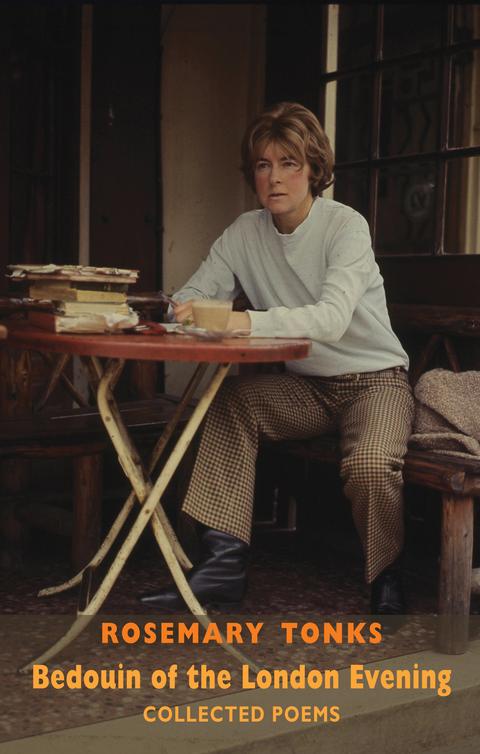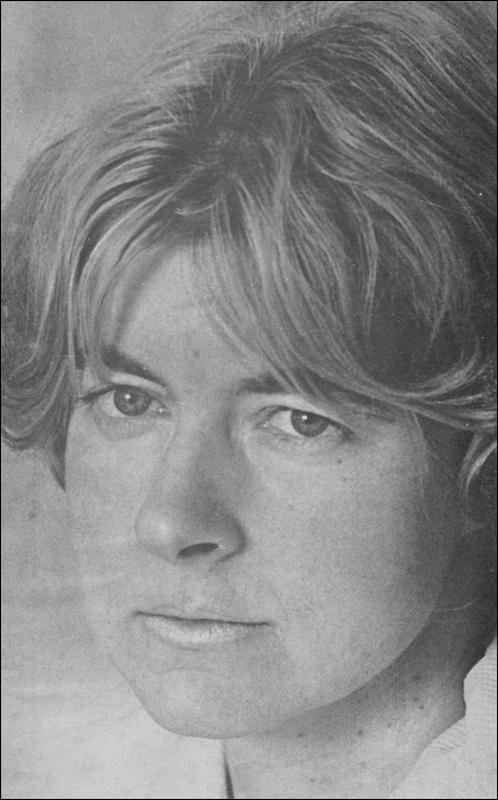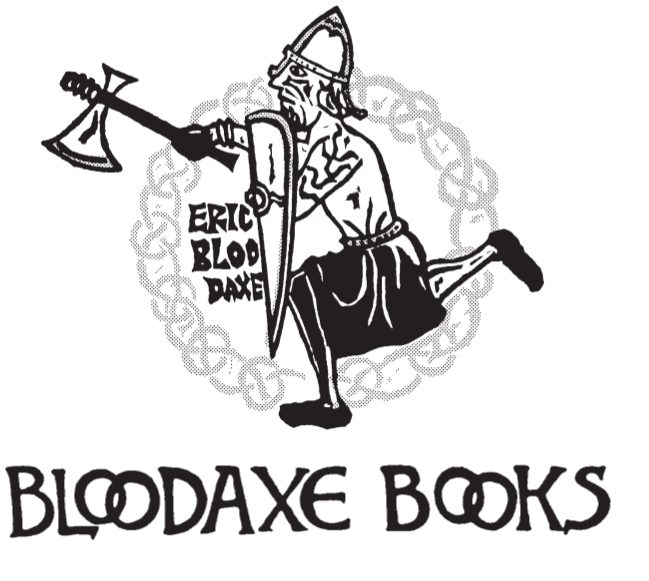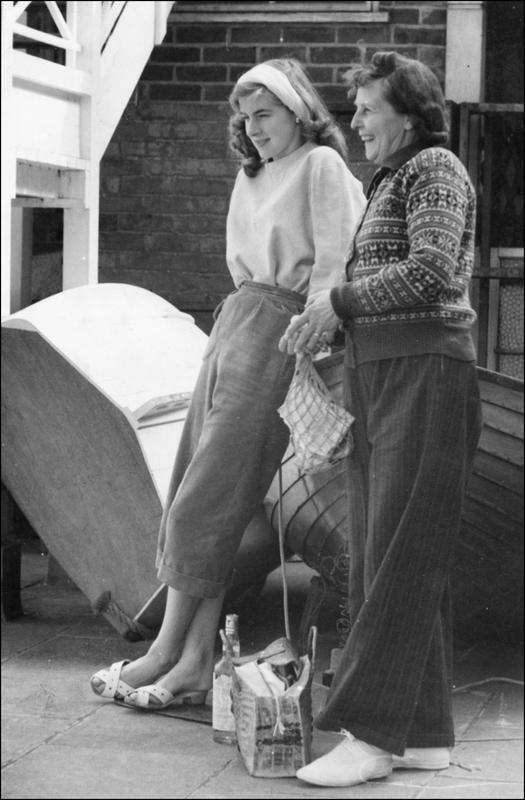Bedouin of the London Evening
Read Bedouin of the London Evening Online
Authors: Rosemary Tonks


BEDOUIN OF THE LONDON EVENING
COLLECTED POEMS
The disappearance of the poet Rosemary Tonks in the 1970s was one of the literary world’s most tantalising mysteries – the subject of a BBC feature in 2009 called
The Poet Who Vanished
.
After publishing two extraordinary poetry collections – and six satirical novels – she turned her back on the literary world after a series of personal tragedies and medical crises which made her question the value of literature and embark on a restless, self-torturing spiritual quest. This involved totally renouncing poetry, and suppressing her own books.
Interviewed earlier in 1967, she spoke of her direct literary forebears as Baudelaire and Rimbaud: ‘They were both poets of the modern metropolis as we know it and no one has bothered to learn what there is to be learned from them… The main duty of the poet is to excite – to send the senses reeling.’
Her poetry – published in
Notes on Cafés and Bedrooms
(1963) and
Iliad of Broken Sentences
(1967) – is exuberantly sensuous, a hymn to sixties hedonism set amid the bohemian nighttime world of a London reinvented through French poetic influences and sultry Oriental imagery. She was ‘Bedouin of the London evening’ in one poem:
‘I have been young too long, and in a dressing-gown / My private modern life has gone to waste.’
All her published poetry is now available in this edition for the first time in over 40 years, along with a selection of her prose.
‘Poets, of course, as we all know, are either of their time or for all time. Rosemary Tonks was both. She wasn’t just a poet of the sixties – she was a true poet of any era – but she has sent us strange messages from them, alive, fresh and surprising today… there is possibly no other poet who has caught with such haughty, self-ironising contempt, the loucheness of the period, or the anger it could touch off in brooding bystanders… Rosemary Tonks’ imagery has a daring for which it’s hard to find a parallel in British poetry.’
– John Hartley Williams,
Poetry Review
.
COVER PHOTOGRAPH
Rosemary Tonks in the 1960s
by Jane Bown
COPYRIGHT © GUARDIAN NEWS AND MEDIA LTD 2014

Rosemary Tonks,
c
. 1968
(photo: Michael Peters)
ROSEMARY TONKS
London Evening
COLLECTED POEMS
& SELECTED PROSE

- Title Page
- Introduction
by
NEIL ASTLEY - NOTES ON CAFÉS AND BEDROOMS
(1963) - Dedication
- Love Territory
- Running Away
- 20th Century Invalid
- Diary of a Rebel
- Bedroom in an Old City
- The Flâneur and the Apocalypse
- Fear’s Blindworm
- The Solitary’s Bedroom
- Rainfield and Argument
- Gutter Lord
- Poet and Iceberg
- Oath
- Ace of Hooligans
- Rome
- Hypnos and Warm Winters
- Escape!
- Story of a Hotel Room
- Bedouin of the London Evening
- Boy in the Lane
- Fog Peacocks
- Poet as Gambler
- Apprentice
- Blouson Noir
- Bedouin of the London Morning
- April and the Ideas-Merchant
- On the advantage of being ill-treated by the World
- ILIAD OF BROKEN SENTENCES
(1967) - The Sofas, Fogs, and Cinemas
- The Sash Window
- Epoch of the Hotel Corridor
- Badly-chosen Lover
- The Little Cardboard Suitcase
- Hydromaniac
- Students in Bertorelli’s
- The Desert Wind Élite
- An Old-fashioned Traveller on the Trade Routes
- The Ice-cream Boom Towns
- Addiction to an Old Mattress
- Song of the October Wind
- Done for!
- Orpheus in Soho
- Dressing-gown Olympian
- Farewell to Kurdistan
- Black Kief and the Intellectual
- The Drinkers of Coffee
- To a Certain Young Man
- A Few Sentences Away
- SELECTED PROSE
- Note on
Notes on Cafés and Bed
rooms
[1963] - Interview with Peter Orr
[1963] - Cutting the Marble
[1973] - The Wisdom of Colette
[1974] - The Pick-up or L’Ercole d’Oro
[1973] - Copyright
Take care whom you mix with in life, irresponsible one,
For if you mix with the wrong people
– And you yourself may be one of the wrong people –
If you make love to the wrong person […]
They will do you ferocious, indelible harm!
Far beyond anything you can imagine, jazzy sneering one,
And afterwards you’ll live in no man’s land,
You’ll lose your identity, and never get yourself back […]
1
The disappearance of the poet Rosemary Tonks in the 1970s was one of the literary world’s most tantalising mysteries. For many years bizarre theories abounded as to her whereabouts –
if
she was still alive – many of these finding their way into reputable guides. As Brian Patten put it in a BBC Radio 4 feature in 2009 called
The Poet Who Vanished
: ‘Rosemary Tonks evaporated into air like the Cheshire cat.’
2
Nobody seemed to know what had happened to her and why, the general belief being that she’d found religion, shut herself away and become a recluse. All her books were out of print and she was said to have disowned everything she had written.
Having tried to visit her myself, ten years ago, I was aware that her actual situation was rather different from what everyone had imagined. But out of respect for her declared wish, maintained by her family, that she should be left in peace, I told no one what I knew, continuing to nurse the hope that with encouragement she might one day relent and allow her poetry to be republished.
Since her death in April 2014 – at the age of 85 – a very different picture has emerged of her later life, shedding new light on why it was that she turned her back on literature – following a series of personal tragedies and medical crises – embarking on a self-torturing spiritual quest which required her to repudiate her own books. That involved a complete change of identity, from Rosemary Tonks, the fêted London writer, to the socially challenged Christian
convert Mrs Rosemary Lightband, who lived a solitary life (although not as a recluse) in the seaside town of Bournemouth for the next 35 years.
Over an eleven-year period, from 1963 to 1974, Rosemary Tonks published two epoch-defining poetry collections,
Notes on Cafés and Bedrooms
(1963) and
Iliad of Broken Sentences
(1967),
3
six acerbic, satirical novels,
4
and a number of short stories. She wrote trenchant reviews for leading journals and newspapers, and also collaborated with the BBC Radiophonic Workshop and Hampstead Festival on an experimental sound-poem,
Sono-Montage
(1966).
Interviewed in 1967, she declared her direct literary forebears to be Baudelaire and Rimbaud: ‘They were both poets of the modern metropolis as we know it and no one has bothered to learn what there is to be learned from them… The main duty of the poet is to excite – to send the senses reeling.’
5
In sharp contrast with the traditional, well-behaved, dry, self-deprecating verse being published at that time by most of her English contemporaries, her poetry was declamatory, bold, spirited, extravagant and exuberantly sensuous, a hymn to sixties hedonism set amid the bohemian nighttime world of a London reinvented through French poetic influences and sultry Oriental imagery.
Anthony Rudolf praised the ‘visionary quality’ of her poems: ‘They seem to me to have by-passed the Movement poetry of the 1950s and to have emerged from the 1940s poetic matrix of Nicholas Moore, George Barker and J.F. Hendry, poets she would have read in her early twenties. It is a hyper-urban angst-ridden poetry, with ancestry stretching back to Baudelaire’s
Spleen de Paris
and the Francophile English symbolists.’
6
In another interview (see p.
109
), Tonks asserted:
I don’t understand why poets are quite ready to pick up trivialities, but are terrified of writing of passions. […] People are born, they procreate, they suffer, they are nasty to one another, they are greedy, they are terribly happy, they have changes in their fortune, and they meet other people who have effects on them, and then they die; and these thousands of dramatic things happen to them, and
they happen to everybody. Everybody has to make terrible decisions or pass examinations, or fall in love, or else avoid falling in love. All these things happen and contemporary poets don’t write about them. Why not?
7
Among the noted admirers of her work in the London literary set were Cyril Connolly (‘Miss Tonks’s hard-faceted yet musical poems have unexpected power’) and A. Alvarez (‘real talent of an edgy, bristling kind’). But other critics in the predominantly male poetry world were angered, intimidated or baffled by her poems. For Julian Symons,
Notes on Cafés and Bedrooms
was ‘a very odd book, a jumble of images jittered out from Miss Tonks’s sub- or semi-consciousness. Many of them are unintelligible to me […] some are ridiculous, some impressive. […] The substance of the poems, so far as I understood them, seemed to me pretty thin.’
8
The negative reviews may have affected her willingness to publish or even to write. ‘I have never met anyone who was so hurt by critics,’ wrote Terry Coleman in a
Guardian
profile,
9
asking her why this was when poetry critics were ‘a second-rate bunch’: ‘She says she does not want to be killed, all the same.’ Inscribing a copy of
Iliad of Broken Sentences
for a friend, she wrote: ‘Please forgive me for not writing. Last year I had melancholia. They just
smash
and
smash
my poetry. So these are the last roses I shall write.’
10
Despite being unavailable for four decades, her poetry came to be admired by a new generation – or rather, generations – of poets, from Andrew Motion, Jo Shapcott and Matthew Sweeney to Matthew Caley and John Stammers, who borrowed the title of his collection,
Stolen Love Behaviour
(2005), from her poem ‘Badly-chosen Lover’ (p.83). I had been excited by her work since first coming across a few of her poems in anthologies. It seemed extraordinary that this amazing poet’s work was no longer available, and I followed up various leads over many years in an attempt to trace her, hoping that this new interest from a later generation of readers and writers might persuade her to allow her books to be reissued.
Another longtime advocate, the Berlin-based poet John Hartley
Williams (who also died this year) wrote a full-length reappraisal of her work for
Poetry Review
in 1996:
11
Poets, of course, as we all know, are either of their time or for all time. Rosemary Tonks was both. She wasn’t just a poet of the sixties – she was a true poet of any era – but she has sent us strange messages from them, alive, fresh and surprising today… there is possibly no other poet who has caught with such haughty, self-ironising contempt, the loucheness of the period, or the anger it could touch off in brooding bystanders… Rosemary Tonks’ imagery has a daring for which it’s hard to find a parallel in British poetry.
New York critic John Thompson wrote that ‘she produces that unusual thing, a collection of poems that presents a genuine personality, even a character, and a whole way of life’.
12
Yet this was a world which both attracted and repelled her, and she was to turn against its materialism, false values, betrayals and indulgence: ‘The mistakes, the wrong people, the half-baked ideas, / And their beastly comments on everything. Foul. / But irresistibly amusing, that is the whole trouble’ (‘The Little Cardboard Suitcase’, p.84).
She was ‘Bedouin of the London evening’ in one poem (p.63): ‘I have been young too long, and in a dressing-gown / My private modern life has gone to waste.’
And ‘waste’ was how indeed she came to see her life in ‘that frightful epoch’ – while her own work was ‘dangerous rubbish’ – when she followed her forebear Rimbaud in renouncing literature totally, believing that Proust, Chekhov, Tolstoy and French 19th-century poetry had carried away her mind, locked her up in libraries, and led her away from ordinary, everyday things, from truth and from God.
13
Rosemary Tonks was born in 1928 in Gillingham, Kent, the only daughter of Gwendoline (
née
Verdi)
14
and Desmond Tonks, a mechanical engineer who died from Blackwater fever in Nigeria before her birth. His widow gave her the name Rosemary – for remembrance – along with his forenames, christening her Rosemary Desmond Boswell Tonks. (She was later to use the pseudonym
Desmond Tonks when publishing her early poetry: ‘Ace of Hooligans’ and ‘Boy in the Lane’ first appeared under that name in Miron Grindea’s
Adam international review
in 1956.)
Desmond was the nephew of the surgeon and painter Henry Tonks, who joined the army’s medical corps during the First World War and helped Harold Gillies’s pioneering work in plastic surgery with his pastels and drawings of facial injury patients. Desmond’s brother Myles was married to Gwen’s sister Dorothy, who was later to provide Rosemary with refuge in Bournemouth when her life crisis had become unbearable alone.
When her mother was unable to cope, Rosemary had to be looked after in children’s homes.
16
They moved house 14 times during the war (‘to avoid bombs and people’),
17
and Rosemary was sent at an early age to boarding school at Wentworth College in Bournemouth, which ‘turned out each year thirty of the gentlest wives in England’.
18
Precociously brilliant but disruptive and intolerant of authority, she left school at 16. According to accounts
19
questioned by her family, she was expelled. ‘I ruined my schooldays through my inability to control myself,’ she later recalled.
20
She was affected by eyesight problems as an infant, with a squint, a lazy left eye and astigmatism in both eyes, which must have reinforced her sense of being separate from others at school and later. Her one constant became literature and her own writing.
By 1946 she was living in Lagos with her mother and new stepfather, ‘with a large house, a shotgun, six or seven servants, and attacks of dysentery and malaria’.
21
Like her father, her stepfather was to die in Nigeria. At 18 she was ‘back in London with her mother, very poor, and beginning to read Joyce and Baudelaire’,
22
discovering public libraries, and hanging out at the Mandrake Club and the Caves de France in Soho, two bohemian watering-holes then at the centre of London’s postwar counterculture that were popular with louche artistic types.
Rosemary Tonks was a writer from childhood. A prodigious reader, she wrote children’s stories while still at school, one of which,
Miss Bushman-Caldicott
, was broadcast on BBC radio in
1946 and subsequently included in
Uncle Mac’s Children’s Hour Story Book
. Her first published book,
On Wooden Wings: The Adventures of Webster, written and illustrated by Rosemary Tonks
, followed from John Murray in 1948.
In 1949, aged 20, she married Michael (Micky) Lightband, an engineer (later a financier) six years her senior. Her occupation on the marriage certificate is given as ‘writer’. Identifying with Colette in a later essay (p.127), she wrote: ‘She was literary to the core, and her effects were calculated, as it was proper they should be.’
Her husband’s work took them to India and Pakistan, where she contracted paratyphoid fever in Calcutta, followed by polio in Karachi (in 1952). Recovering from paralysis in England, she was left with a slightly withered right hand. Such was her determination that she taught herself to write and paint with her left hand, and took to wearing a rakish black glove over the other. These experiences were to feed her portrayal of the young poet who catches polio in her fifth novel,
The Way Out of Berkeley Square
(1970).
With Micky still in Pakistan, she went to live in Paris alone: ‘In illness you want to be alone, and England was full of relations.’
23
Living for a year (1952-53) on the Île St Louis, close to the spirits of Baudelaire and Rimbaud, she was able to immerse herself in Parisian culture and French literature. One of the few surviving photographs of her (p.17) shows a chicly dressed, slender young woman standing in front of Rodin’s Stendhal monument in the Jardin du Luxembourg. On a later visit to Paris – in 1967, the centenary of Baudelaire’s death – she went to pay homage to the poet in Montparnasse cemetery, lying down beside his life-size effigy on José de Charmoy’s Baudelaire monument to confirm that they were the same height.
24
Reunited the following year in London, the couple set up home in the fashionable area of Downshire Hill, Hampstead, where Rosemary played at being hostess firstly for Micky’s business associates and later for her own entourage when her literary career took off. Living just round the corner from Dame Edith Sitwell – and ‘hobnobbing’ with her, she told family – Rosemary Tonks was a singular figure in London’s artistic circles, a world she portrayed with both relish and distaste in sharply observed, semi-autobiographical novels like
The Bloater
(1968), ‘the story of a witty, capricious but vulnerable young woman of London, caught in the more than half-serious dilemma of whom to choose as a lover’.
25
Like her alter ego Min in
The Bloater
(‘married, but like a reckless little schoolgirl still unbroken’), she was playful, alluring, vivacious and commanded attention. Her cousin Tim Butchard recalls lively evenings in the Hampstead house: ‘She effervesced and often held a dinner table spellbound (I remember one with Paul Huxley, Sir Julian Huxley and wife Juliette, Andrew Barrow and others).’
26

Rosemary Tonks with a friend (Mrs Trent),
c
. 1948.
